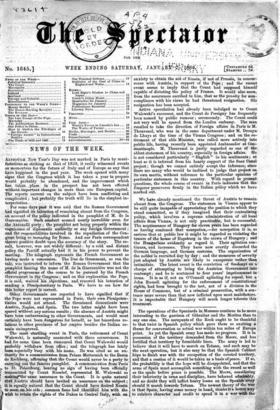NEWS 01? THE WEEK.
A.LTICOUGII New Year's Day was not marked in Paris by mani- festations so striking as that, of 1859, it really witnessed events as momentous for the future of Italy and of Europe as any that
have happened in the past year. The week opened with many . . signs that the Congress which it has taken a year to prepare would probably be abandoned, and the improvement which has taken place in the prospect has not been effected without important changes in more than one European capital. The reports current on the subject have been conflicting and complicated ; but probably the truth will lie in the simplest in- terpretation. .
For some days past it was said that the Roman Government had signiiied its intention of remaining absent from the Congress, on account of the policy indicated in the pamphlet of M. de la Gueronniare. Such conduct seemed nearly incredible even for the Antonelli party ; the pamphlet not being properly within the cognizance of diplomatic autb:ority or any foreign Government ; and the responsibilities involved in the repudiation of the Con- gress being so menacing for Rome. And our Paris correspondent throws positive doubt upon the accuracy of the story. The re- sult, however, was not widely. different : by a cold and distant policy the Pontiff actually, had it in his power to prevent the meeting. The telegraph r,epre-sents the French Government as having made a concession. The Due de Grammont, so ran the tale, was instructed to inform' the Roman Government that the pamphlet bearing the name of M. de la :Gneronnire was not the official programme of the course to be pursued by the French Government in the Congress ; and on this explanation the Pope, it is said, waived his objections, and renewed his intention of sending a Plenipotentiary to Paris: We have to see how far this better report is correct.
Other Governments are reported to have signified that if the Pope were not represented in Paris, their own Plenipoten- tiaries would not attend. The threatened dissentients were Austria, Naples, and Spain. The two latter might have been spared without any serious results ; the absence of Austria might have been embarrassing to other Governments, and would most certainly have been dangerous for herself, as her hazardous re- lations to other provinces of her .empire besides the Italian re- main Unimproved. _ The most startling event in Paris, the retirement of Count Walewski, is naturally connected with these oCcurrences. It had for some time been. rumoured that Count Walewski would probably withdraw from office ; and the telegraph has lately been especially busy with his name. He was cited as an au- thority for a communication from Prince Metternioh to the Baron de Rechberg, affirming that the Count would never be a party to carrying out the famous pamphlet. A communication from Paris
... to St. °Petersburg, bearing no sign of having been officially transmitted by Count Kisselef, represented M. Walewski as
■ makinethe same assurance to the Count. It is quite natural that Austria should have invited an assurance on the subject ; ; it is equally natural that the Count should have desired Russia to seem on his side ; common fame had identified him with the wish to retain the rights of the Dukes in Central Italy, with an anxiety to obtain the aid. of Russia, if not of Prussia, in concur- rence with Austria, in support of the Pope ; and the recent event seems to imply that the Count had supposed himself capable of dictating the policy of France. It would also seem, from the assurances ascribed to him, that as the penalty for non- compliance with his views he had threatened resignation. His resignation has been accepted.
Active speculation had already been indulged as to Count Walewski's successor, and the Count de Persigny has frequently been named by public rumour ; erroneously. The Count could not very well be spared from the London embassy. The man recalled to take the direction of Foreign affairs in Paris is M. Thouvenel, who was in the same department under M. Dronyn, de Lhuys at the time of the Vienna Congress ; and on the re- tirement of that able Minister, was called more actively into public life, having recently been appointed Ambassador at Con- stantinople. M. Thouvenel is justly regarded as one of the ablest statesmen of his country, especially in foreign affairs. He is not considered particularly "English" in his sentiments ; at least so it is inferred. from his hearty support of the Suez Canal project; though we cannot entirely accept the inference, since there are many who would be inolined to judge that project on its own merits, without reference to the particular opinions of particular statesmen in this country. With regard to present questions, the whole course of events in Paris indicates that the Emperor perseveres firmly in the Italian policy which we have
marked out.


























